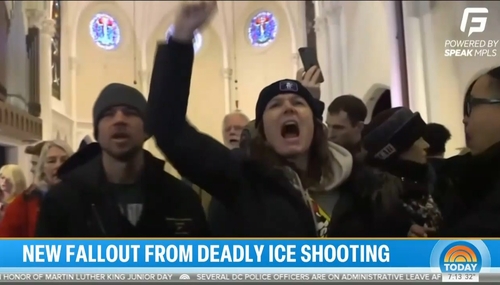Yesterday afternoon the Washington Post filed to its website a quick take on Bush's speech to the Naval Academy on Iraq, including the president's emotional quotation from a letter found on the laptop of Marine Cpl. Jeffrey Starr, six months to the day after his death in a firefight in Ramadi.
"Reading from a letter written by a U.S. soldier on his lap-top computer before his death, an emotional Bush said America owes those who have died in Iraq to 'take up their mantle, carry on the fight and complete their mission.'"
By contrast, the Times online story from Christine Hauser made no mention of Starr's letter. Perhaps one reason why: As Michelle Malkin first learned, The New York Times quoted Starr's letter in a story last month, but managed to miss the point, leaving off the very part Starr's family and President Bush found significant.
An October 26 story by reporter James Dao quoted only part of Starr's letter, truncating it to make it fit his deadly storyline (the "grim mark" of the 2000th fatality of the Iraq War). The portion of the letter run by the Times captured Starr's fear of death, but not his belief that his sacrifice was worth the goal of securing freedom for Iraq.
This is the part the Times ran: "Obviously if you are reading this then I have died in Iraq. I kind of predicted this, that is why I'm writing this in November. A third time just seemed like I'm pushing my chances."
But as Times Watch and others noted, Dao left off the rest of Starr's letter, which explains why he felt his sacrifice was worthwhile:
"I don't regret going, everybody dies but few get to do it for something as important as freedom. It may seem confusing why we are in Iraq, it's not to me. I'm here helping these people, so that they can live the way we live. Not have to worry about tyrants or vicious dictators. To do what they want with their lives. To me that is why I died. Others have died for my freedom, now this is my mark.'"
Today's New York Post carries the positive reaction by Starr's family to Bush's mention. The family originally released their son's letter to the New York Times, "But the Times published only part of the five-paragraph letter, which the family felt distorted Jeffrey's message and made him appear to be a fatalist questioning the war -- when in fact he strongly supported it."
Neither the New York Times or the Washington Post mention Starr's letter in their Thursday morning hard-copy editions.
For more examples of bias in the New York Times, visit TimesWatch.




